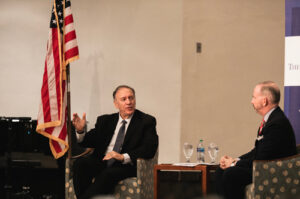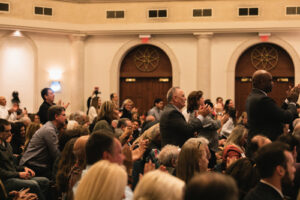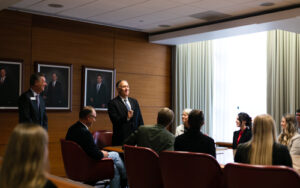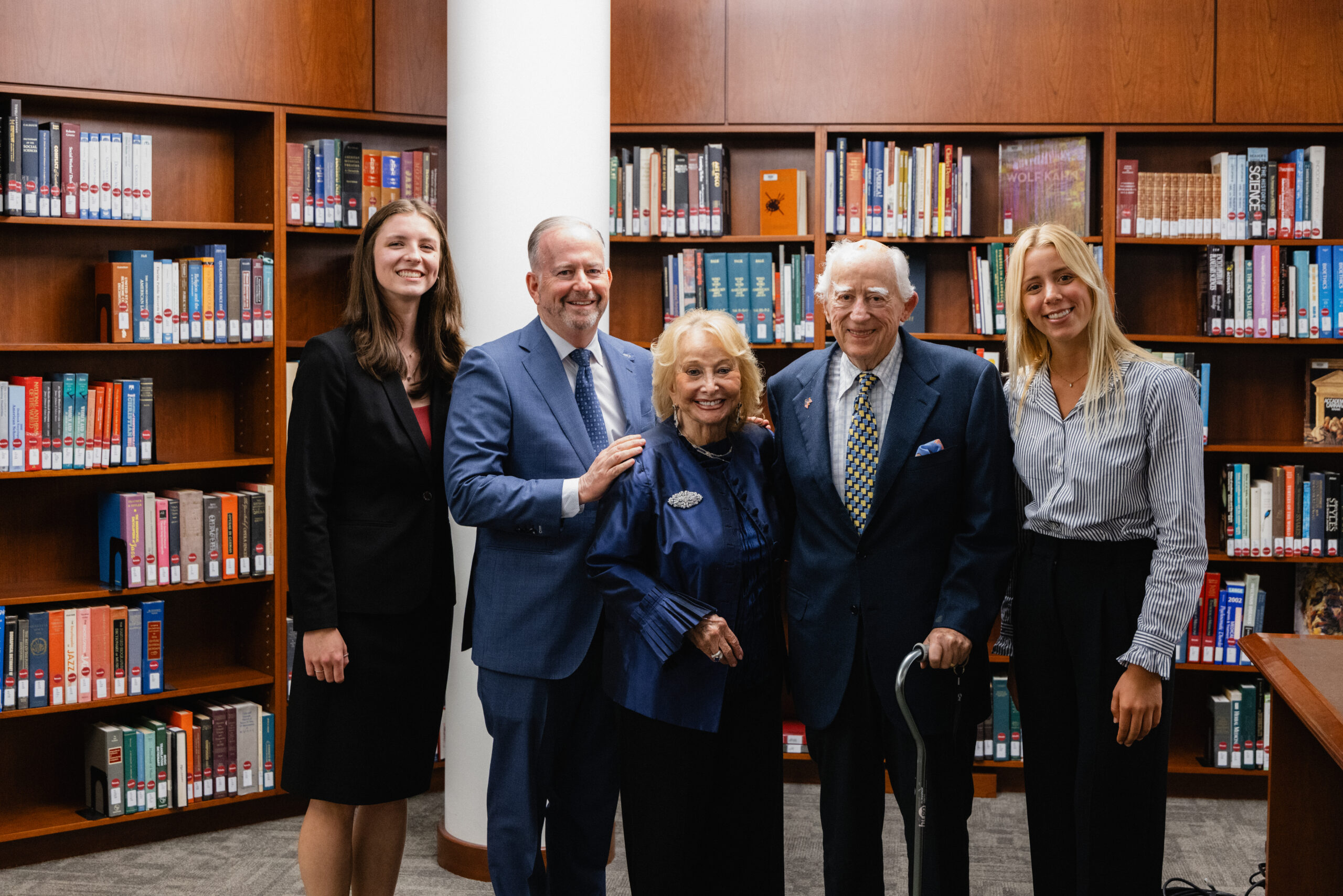Editor’s Note: This event occurred and this story was published before Russia’s invasion of Ukraine.

Speaking at a LeMieux Center for Public Policy event earlier this month, 70th Secretary of State and sixth director of the Central Intelligence Agency Mike Pompeo discussed brokering Middle East peace, a secret trip to North Korea and the ongoing challenges posed by China and Russia.
Former U.S. Sen. George S. LeMieux, for whom the center is named, introduced Pompeo as “an extraordinary American” to the 400 people gathered in the DeSantis Family Chapel and watching from an overflow room.
Pompeo is the first American to have served as both CIA director and Secretary of State and the first Secretary of State to come to the LeMieux Center for Public Policy. The center has hosted former British Prime Minister Tony Blair, Supreme Court Justice Clarence Thomas and former presidential speech writer Peggy Noonan, among other notable figures.
Referring to his time at the CIA, Pompeo said, “I was just so lucky to have that chance. You see it in the movies. I got to see it in real life.”
When LeMieux asked “When are we going to see Mike Pompeo back in public office?” addressing speculation Pompeo will enter the 2024 presidential race, he answered, “I have no idea” but added that his trips to Iowa and New Hampshire are no accident.
Foreign Affairs
Pompeo refrained from speculating what will happen on the Russia-Ukraine border, where Russia has deployed more than 100,000 troops. He said the sanctions campaign announced by the White House is “the right approach” for dealing with Russian aggression.
“We need to send the right message,” he said, adding the U.S. should tell Europe, “You take the heavy oar, and we’ll provide the support you need to push back.”
Europe struggles to present a united front, in part because Germany relies on oil from a pipeline in Russia to keep its houses warm, Pompeo said.
Russian President Vladimir Putin runs one of the largest economies and controls one of the largest nuclear stockpiles in the world.
“He is a serious man whose power and guile we should respect,” Pompeo said.
Similarly, China’s President Xi Jinping is attempting to establish “global, hegemonic influence.” “This will be the challenge of the next generation,” Pompeo said. “He believes the West is decadent and in decline.”
Xi will use soft power, such as espionage, to gain influence, Pompeo said. Xi’s efforts are enabled in part by 40 years of U.S. policy encouraging Americans to do business with China. In the space race, cyber security and commerce, the U.S. must make sure its relationship with China is reciprocal, Pompeo said. China makes former President Ronald Reagan’s dealings with the Soviet Union “look like child’s play,” he added.

The crowd cheered when Pompeo, addressing relations in the Middle East, said the U.S. has a great partner in Israel and will defend Israel however it can. Pompeo touted the success of the Abraham Accords, a joint agreement between Israel, the United Arab Emirates and the United States to normalize relations between the Middle Eastern nations.
While previous administrations tried and failed to find boundary lines all the key players could agree on, Pompeo set out to “make peace with everyone else for Israel.” He acknowledged it was hard-fought and maintained that “most of the problems today stem from Iranian malfeasance.”
Advisers cautioned against moving the U.S. embassy to Jerusalem but the administration did it anyway.
“We were told if you move the embassy to Jerusalem, there will be a war, and there wasn’t,” Pompeo said.
Turning to the U.S. withdrawal from Afghanistan, Pompeo said President Joe Biden had a noble desire to bring all American soldiers home, and President Donald Trump wanted that, too. But “we also knew that to do that, the conditions needed to be right.”
Deterrent threats from the U.S. kept violence at bay while officials like Pompeo worked at creating the conditions for withdrawal, he said. “While I was negotiating with these really bad guys, the Taliban, we managed to keep Afghanistan stable.”
Referring to his time as CIA director, Pompeo described a secret trip to North Korea to persuade dictator Kim Jong Un to give up his nuclear weapons program. He visited three or four more times as Secretary of State, he said.
Faith in the Public Square
Pompeo’s daily intelligence briefings with the President helped him build trust and earn the Secretary of State job, he said. “It was a chance to deliver on the very policies I was providing information for.”
He recounted the moments before his swearing in. His wife, Susan, and son, Nick, prayed together and then walked down a long hallway with portraits of every previous Secretary of State on display. Nick looked at him and said, “I don’t think so, Dad.”
Pompeo said he accepted he was never going to be John Quincy Adams or Thomas Jefferson but always kept in mind, “You can use America’s founding history to inspire you and your team every day.”

Prior to his public remarks, Pompeo spoke with a group of high-achieving students selected to participate in a Q&A session. He began by encouraging them to stay focused on their values and not fear hard work. They have a responsibility, he said, to use their privilege to give back to others, whether in inner-city West Palm Beach or sub-Saharan Africa.
He told students he was proud of his successful efforts — despite naysayers — to build a chaplain corps for the CIA. Today, there are a dozen chaplains serving agents in various regions of the world, he said.
He recounted a time when he overruled his speechwriters and insisted on opening a speech in Cairo with, “I am an evangelical Christian,” knowing that the audience was predominantly Muslim. Both he and his audience knew they had very different beliefs about Jesus, but they understood that he respected them, he said.
Pompeo’s team wanted people around the world of any faith to be able to openly practice it, he said. Not only is it the right thing to do, but countries with greater religious freedoms are generally more peaceful than those with less, he said.
Pompeo and his wife, Susan, taught fifth grade Sunday School together. He tried his best to begin each day with prayer and reading from the Bible, he said.
He’s been criticized for his faith, which is an inseparable part of himself, he said.
“It gave me the strength to keep pushing on.”
LeMieux Center Interview – Mike Pompeo
The LeMieux Center for Public Policy hosts five former U.S. Ambassadors for Women’s History Month

